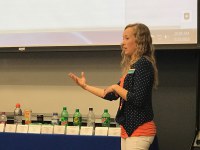NDSU Extension Diabetes Prevention Program Making a Difference
(Click the image below to view a high-resolution image that can be downloaded)
Gary McCullough used to think he had a good plan for shedding some unwanted pounds.
“I thought to lose weight, I could just eat less of the same kinds of foods,” he says.
Then the Valley City man attended a diabetes prevention program that North Dakota State University Extension hosted. He found out that wasn’t the case.
He lost 20 pounds as a result of the program. He learned to make better food choices and took over meal preparation at home. He also began exercising 150 minutes weekly.
“Our program is called the National Diabetes Prevention Program,” says Nikki Johnson, NDSU Extension community health and nutrition specialist. “The program is all about how to create healthier behaviors and improve your lifestyle.”
The one-year community-based program includes educational sessions and support for people with prediabetes and those at a high risk for prediabetes. It is designed to help people take control of their health by making healthful food choices, losing weight, being more active and learning stress management techniques.
Specifically, the program promotes weight loss of 5% to 7% through long-term healthful eating and 150 minutes of physical activity per week. Participants meet weekly for 16 weeks, then monthly for eight months. Extension offers the class at no charge or for a nominal fee.
Diabetes is a major concern in North Dakota. Approximately 200,000 North Dakotans have prediabetes. That means they have sugar levels that are above normal but not high enough to be diabetes. Having prediabetes puts an individual at greater risk of developing Type 2 diabetes and heart disease, or having a stroke.
“With no intervention, 15% to 30% with prediabetes will develop diabetes in the next five years,” says Molly Soeby, NDSU Extension’s family and community wellness agent in Grand Forks County. “On average, medical expenses are 2.3 times higher for those with diabetes than for those without diabetes.”
In North Dakota, more than $900 million is spent annually on diagnosed diabetes costs. More than $190 million of that is indirect costs from loss of people’s productivity.
Delaying or preventing one person from developing diabetes will save about $8,000 per year in medical costs, according to Soeby.
“The good news is that if you have prediabetes, the CDC (Centers for Disease Control and Prevention)-led Diabetes Prevention Program can help you make lifestyle changes to prevent or delay Type 2 diabetes and other serious health problems,” says Rita Ussatis, NDSU Extension’s family and community wellness agent in Cass County.
NDSU Extension has teamed up with public health staff and local health-care providers throughout the state to offer the National Diabetes Prevention Program. Extension also is involved in other partnerships, such as running classes for Sanford Health Plan members.
Extension agents such as Soeby also have become master trainers for the program.
“This has allowed Extension to train other agents and partners to be lifestyle coaches delivering the National Diabetes Prevention Program,” she says. “This allows for greater sustainability in our communities, especially critical in our rural areas, by having the ability to train local lifestyle coaches.”
Surveys show the program is working:
- One hundred percent of participants have reported adopting two or more improved nutrition habits after completing the program.
- Ninety percent of participants showed an increased level of physical activity since starting the program.
- Participants reported improved blood glucose, cholesterol and blood pressure levels.
“The program is successful because the participants are supported in their journey,” says Susan Milender, the NDSU Extension family and community wellness agent in Barnes County. She led the class McCullough completed.
“The support is felt by having accountability partners who care, encourage and cheer for others,” she adds. “In essence, our group becomes a family.
“The program is not rocket science,” she notes. “However, the tools that are passed along in the classes, the meticulous attention to details, and the support given throughout the program are what makes this program effective. The program is all about creating and sustaining healthy habits for a lifetime.”
McCullough encourages others to take advantage of the program that NDSU Extension is offering.
“It’s a matter of if we want the help, it’s there,” he says.
NDSU Agriculture Communication - Feb. 18, 2020
| Source: | Nikki Johnson, 701-231-5165, nikki.a.johnson@ndsu.edu |
|---|---|
| Editor: | Ellen Crawford, 701-231-5391, ellen.crawford@ndsu.edu |


